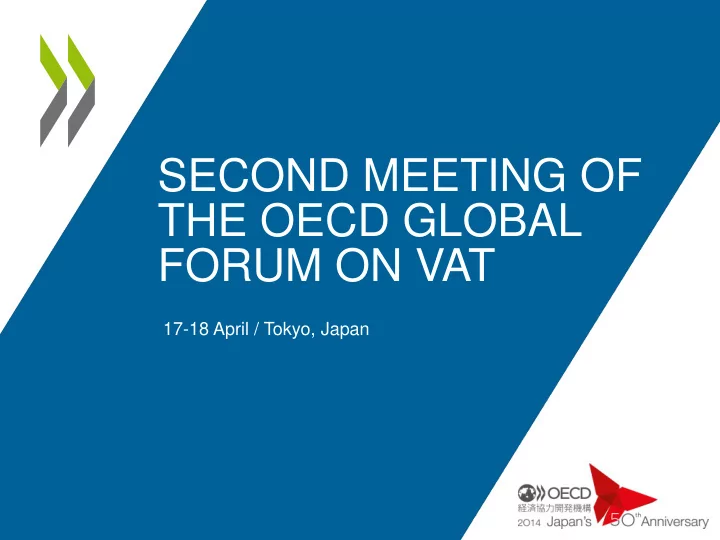

SECOND MEETING OF THE OECD GLOBAL FORUM ON VAT 17-18 April / Tokyo, Japan
SESSION 1: GLOBAL VAT POLICY TRENDS AND DEVELOPMENTS 2
• Key developments in the EU, incl. the EU’s 2015 “one stop shop” reform for supplies of e-services by non-EU suppliers to EU consumers • Mr Donato Raponi, Head of VAT Unit, Taxation and Customs Union, EU Commission 3
Introduction • Since VAT is a consumption tax, revenues should accrue to the country of consumption • This is best ensured through taxation at destination 4
Place of taxation • Most B2B services already taxed at destination • B2C services in general taxed at origin (the place where supplier is established) • Some B2C services however taxed at destination • Taxation at destination may evolve further as required 5
Wider context • Must be seen against the background of work undertaken by – OECD Task Force on taxation of the digital economy as part of the BEPS Action Plan – EU Commission Expert Group examining the best ways of taxing the digital economy in the EU 6
2015 changes • Principle adopted – shifting to taxation at destination – now for all suppliers (EU and non-EU) • Services concerned: – telecom, broadcasting and electronic services • Taxation based on: – customer residence (proxy) 7
2015 changes • Prerequisite for change – need to facilitate collection of VAT and enhance cooperation • In response to that – a mini one stop shop (MOSS) introduced – steps taken to put in place arrangements for cooperation 8
What lessons can be drawn? • Destination principle still appropriate as approach for remote supplies but … – how to ensure taxation at the place of consumption? • need for common rules to bolster compliance • MOSS for non-EU suppliers: based on voluntary compliance • consider extending MOSS to other supplies like goods supplied over the Internet (e-commerce) • More international cooperation required – between countries • administrative cooperation arrangements (OECD Model Tax Convention?, bilateral agreements?) • putting in place MOSS at international level? 9
Recommend
More recommend